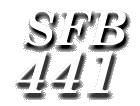
Project B18:
Grammar and pragmatics of the German stative passive
| |
||
|
||
|
||
| |
||
|
Head of the project |
Staff |
||
| Prof. Dr. Claudia Maienborn Deutsches Seminar Universität Tübingen Wilhelmstraße 50 72074 Tübingen |
|
||
| Tel.: +49/7071/29-78445 Fax: +49/7071/29-5760 office: Andrea Berger; Tel: +49 7071 29 74269 E-Mail: claudia.maienborn@uni-tuebingen.de WWW: Homepage |
|
||
Research assistants: Corpus linguistics: Simone Alex Psycholinguistics: Nadja Choeb |
|||
|
Consultant members: Dr. Doreen Bryant
|
Central aims
The
project investigates the meaning constitution of the German stative
passive. The central aim is to analyze the underlying lexical,
grammatical, conceptual, and pragmatic conditions of the stative
passive and to reconstruct their interrelations in a theoretically and
empirically well motivated model which takes into account different
kinds of data types (corpus data, experimental data, introspective
data).
The major claim of the project is that the role pragmatics plays in the
meaning constitution of stative passive constructions is more
significant than previously assumed and that the role of the lexicon
and grammar is thus to be reduced accordingly.
The starting point of our investigation is the working hypothesis that
the so called stative passive is a combination of a copula plus an
adjectivized verbal participle by which an ad hoc property is ascribed
to the referent of the subject term. While the grammar imposes only few
constraints on the construction; the task of legitimating and
interpreting such an ad hoc property in context is basically the task
of pragmatics.
By referring to the notion of ad hoc properties, the project takes up
recent developments in cognitive psychology with the aim of applying
Lawrence Barsalou's theory of mental representations to linguistic
analysis. The major goal of the project is the formulation of new
insights into the interrelationship of grammar, pragmatics and
cognition. In our view, the category change (verb à adjective) that is
characteristic for the stative passive and its contextual and
conceptual conditions constitute a particularly insightful and scarcely
investigated field of exploration for this kind of interrelation.
For further information refer to Project
proposal in German (pdf)
Publications:
Claudia
Maienborn (2007). Das
Zustandspassiv: Grammatische Einordnung – Bildungsbeschränkungen –
Interpretationsspielraum. In: Zeitschrift für
Germanistische Linguistik 35.1: 83-114.
Helga Gese, Claudia Maienborn &
Britta Stolterfoht (2008). On the formation
of adjectival passives: the case of unaccusatives. Ms.
eingereicht.
Barbara Kaup, Jana Lüdtke & Claudia Maienbonr (2008). "The drawer
is still closed": Simulating past and future actions when processing
sentences that describe a state. Ms. eingereicht.
Britta Stolterfoht,
Helga Gese & Claudia Maienborn (2008). Word category conversion
causes processing
costs: evidence
from adjectival
passives. Ms.
eingereicht.
Helga Gese, Britta Stolterfoht &
Claudia Maienborn (2009). Context effects in the formation of adjectival resultatives.
Erscheint in: S.
Winkler & S. Featherston (eds.) The
Fruits
of Empirical Linguistics. Volume 2: Product. Berlin: de Gruyter.
Claudia Maienborn (2009). Building
event-based ad hoc properties: On the interpretation of adjectival
passives. Erscheint in: Arndt Rister & Torgrim Solstad (eds.) Proceedings of Sinn und Bedeutung
13, 2008.
Last modified 16 March 2009 by Helga Gese